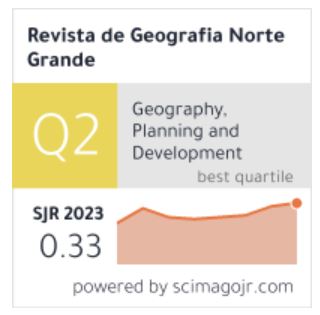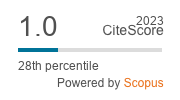Produciendo el oasis, transfiriendo vulnerabilidades. Particularidades hidro-geomorfológicas y transformaciones socio productivas en el Valle de Uco, Mendoza, Argentina
DOI:
https://doi.org/10.4067/S0718-34022020000100131Keywords:
vulnerabilidad; oasis; aluviones; transformaciones socio-productivas; Valle de Uco; MendozaAbstract
The recent process of expansion of the Uco Valley oasis towards the Andean foothills has been carried out by large agricultural enterprises. This advance modifies the alluvial channels of the area and produces new vulnerabilities that impact on other actors and sectors of the territory. Based on a mixed methodology between qualitative research techniques and a geographical analysis, we examine how the features of the dominant agricultural model in the region meet the hydro-geomorphological characteristics of this oasis, enabling a process of production and transfer of new vulnerabilities downstream. To explain this process we follow an approach based on a relational conceptualization of vulnerability and on the instrumental logic of producing the nature, typical of capital accumulation. Our analysis aims to make evident a phenomenon that tends to be invisible and highlights that the agricultural model is only successful for some at the expense of others.
Downloads
References
AMOORE, L. The Politics of Possibility: Risk and Security Beyond Probability. Durham: Duke Univer sity Press, 2013.
ATTERIDGE, A. & REMLING, E. The Indirect Effects of Adaptation: Pathways for Vulnerability Redis tribution in the Colombian Coffee Sector. Stockholm Environment Institute Working Paper, 2013, No 10, p. 1- 40.
BARRIENTOS, J. Informe de Prospectiva Territorial Tunuyán 2030. Proyecto TCP/ARG/3302. Tupun gato: INTA, IDR, Gobierno de Mendoza, 2013.
BONINSEGNA, J. Impacto del Cambio Climático en los Oasis del Oeste Argentino. Revista Ciencia e Investigación, CONICET DIGITAL, 2014, Tomo 64, N° 1, p. 45-58 Disponible en Internet: http:// ri.conicet.gov.ar/handle/11336/4849
CAPITANELLI, R.G. Geomorfología, procesos y formas de modelado de los terrenos. Buenos Aires: CEYNE, 1992.
DGI. Balance Hídrico Tunuyán Superior. Mendoza: Departamento General de Irrigación, 2016.
EAKIN, H., WINKELS, A. & SENDZIMIR, J. Nested vulnerability: exploring cross-scale linkages and vulnerability teleconnections in Mexican and Vietnamese coffee systems. Environmental Science & Policy, 2009, Vol. 12, No 4, p. 398-412.
FOUCAULT, M. El nacimiento de la biopolítica. México: Fondo de Cultura Económica, 2008.
HINKELAMMERT, F. & MORA JIMÉNEZ, H. Hacia una economía para la vida. Preludio a una reconstrucción de la economía. Proyecto Justicia y Vida: Bogotá, 2009.
HORKHEIMER, M. Crítica de la razón instrumental. Buenos Aires: Sur, 1969.
KLEIN, R. J. T., NICHOLLS, R. J., RAGOONADEN, S., CAPOBIANCO, M., ASTON, J. & BUCKLEY, E. N. Technological Options for Adaptation to Climate Change in Coastal Zones. Journal of Coastal Re search, 2001, Vol. 17 No 3, p.531-43.
KVALE, S. Interviews: An introduction to qualitative research interviewing. Thousand Oaks: Sage Publications, 1996.
LARSIMONT, R. Modelo de Agronegocio, Agua y Ruralidad en los oasis de Mendoza, 1990-2017: hacia una Ecología Política Territorial. Tesis Doctoral. Universidad de Buenos Aires, Buenos Aires, 2018.
LARSIMONT, R. CARBALLO, O. & IVARS, J. Las papas de la globalización: el complejo agroindustrial papero en el Valle de Uco, Mendoza, Argentina. Revista Iberoamericana de Viticultura, Agroindustria y Ruralidad. Buenos Aires: Instituto de Estudios Avanzados, 2018, Vol. 5, No 13, p.182-99.
MANZUR, T., & CARBALLO, O. Aportes a la estrategia de convergencia metodológica. Análisis de tipologías de Explotaciones Agropecuarias a partir del Censo Nacional Agropecuario 2008. Actas del V Encuentro Latinoamericano de Metodología de las Ciencias Sociales, 2016. Disponible en Internet: http://elmecs.fahce.unlp.edu.ar/v-elmecs/actas-2016
MONTAÑA, E. Las disputas territoriales de una sociedad hídrica. Conflictos en torno al agua en Mendoza, Argentina. Revista Interamericana de Economía Ecológica, 2008, Vol. 9, p. 1 - 17.
MUSSETTA, P. , BARRIENTOS, J., FERRER, C., MASIOKAS, M., VILLALBA, R., DEIS, L. & CAVAGNARO, B. Vulnerabilidad y cambio climático en Mendoza: brechas sociales, modelo de desarrollo y trans formación del territorio agrícola. Revista Estudios Socioterritoriales, 2018, No 23, p. 11-26.
NAVARRETE, M. GÓMEZ, J. & GALLOPÍN, G. Syndromes of sustainability of development for asses sing the vulnerability of coupled human-environmental systems. The case of hydrometeorological disasters in Central America and the Caribbean . Global Environmental Change , 2007, No 17, p. 207-217.
PORTELA, J., DEBANDI, G., MASTRANTONIO, L. & AQUINDO, N. Atender a la biodiversidad permitiría incorporar la valoración de servicios ecosistémicos intra finca. Cuarto Congreso Internacional de Servicios Ecosistémicos en los Neotrópicos: de la investigación a la acción, Mar del Plata, 2015, p.1-5.
O'BRIEN, K. & LEICHENKO, R. Double exposure: assessing the impacts of climate change within the context of economic globalization. Global environmental change, 2010, Vol. 10, No 3, p. 221-232.
SANTOS, M. La naturaleza del espacio. Técnica y Tiempo. Razón y Emoción. Madrid: Ariel, 2000.
TAYLOR, M. The political ecology of climate change adaptation: livelihoods, agrarian change and the conflicts of development. Londres- Nueva York: Routledge, 2015.
TAYLOR, S. & BOGDAN, R. Introducción a los métodos cualitativos de investigación. Barcelona: Paidós, 1992.
VAN DEN BOSCH, M. E. & BOCCO, A., Dinámica intercensal de los sistemas de producción agrope cuaria de la Provincia de Mendoza. Mendoza: INTA, 2016.
VASILACHIS DE GIALDINO, I. La investigación cualitativa. En VASILACHIS DE GIALDINO, I. Estrate gias de investigación cualitativa . Buenos Aires: Gedisa, 2013, p. 23-64.
WALLERSTEIN, I. La reestructuración capitalista y el sistema-mundo. Conferencia magistral en el XX° Congreso de la Asociación Latinoamericana de Sociología Política, México: 1995. Disponible en Internet: https://flacsoandes.edu.ec/web/imagesFTP/1265665449.La_reestructuracion_capitalista_y_el_sistema.pdf
WALLERSTEIN, I. Ecología y costos de producción capitalistas: No hay salida. Red de Ecología Social. Conceptos y Tendencias, 2004. Disponible en Internet: http://ecologiasocial.com/2004/06/ ecologia-y-costes-de-produccion-capitalistas-no-hay-salida/
WEBER, M. La ética protestante y el espíritu del capitalismo. México: Premiá editora, 1991.
WATTS, J. Now and Then.The origins of political ecology and the rebirth of adaptation as a form of thought. En PERREAULT, T., BRIDGE, G., MC CARTHY, J. The Routledge Handbook of Political Ecology. Londres: Routledge, 2015, p. 19-50.
Nota de prensa: "El futuro de la provincia está en el agua subterránea" Universidad de Cuyo, Mendoza 22 de enero de 2015 disponible en http://www.unidiversidad.com.ar/el-futuro-de-la-provincia-esta-en-el-agua-subterranea.
Registro de Uso de la Tierra. Dirección de Agricultura y Contingencias Climáticas. Gobierno de la Provincia de Mendoza.






